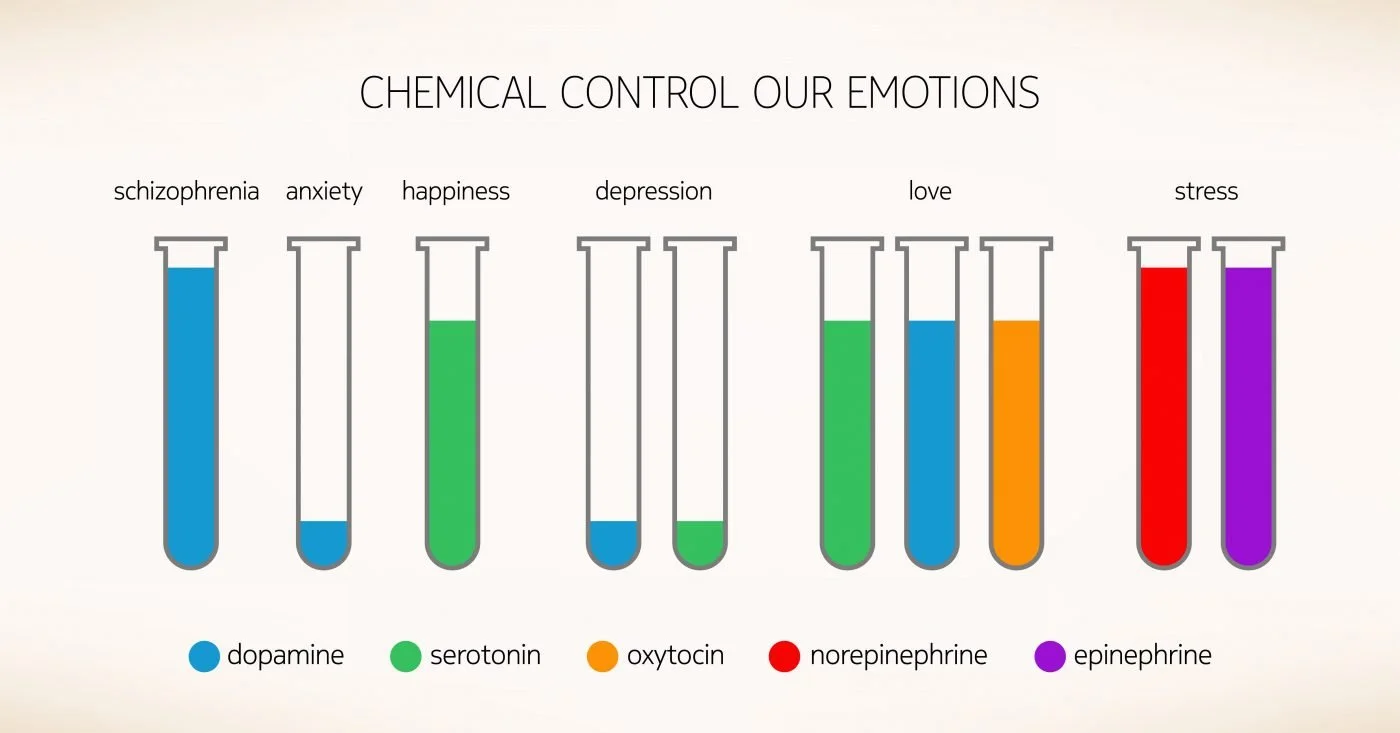Genes and Mood: How Your Genes Can Affect Your Mood
/If you are concerned about mood, mood swings, memory and your mental wellbeing you might be asking whether the genes you have inherited are influential in any way. The short answer is yes.
Since mental health has become very top of mind in these recent times, and I work with DNA every day, I thought it would be insightful to share how patterns in our genes can be one piece of a very complex puzzle that shapes cognitive health.
In this and my next blog, I will very basically discuss how our unique gene blueprint, diet and lifestyle can influence how we feel. Remember as you read these blogs, that genes are NOT diagnostic or predictive and that one gene does NOT change your health. Genes are signposts that trained clinicians consider within the larger context of your health.
This blog will focus on Dopamine and the impact of Cortisol (Stress inducer). If you are interested in listening to me talk about genes that can shape mood, sleep and beyond, the video above covers the subject matter in this blog and my next one too. The summary below is for those of you who prefer to read and get a light touch on the topic. The video is for the detail geeks among you who like to chase down the juicy science bits. Of course you can read and listen to both.
Let’s get started
Chemical Communicators That Control Our Emotions
There are several neurotransmitters (brain hormones) that influence different emotions. Refer to the image below (and please note it’s original source) for a visual understanding of how different levels of these neurotransmitters influence emotions
Stress: High levels of norepinephrine & epinephrine are “fight or flight” hormones that respond to stress. Outside the U.S. they’re known as noradrenaline and adrenaline.
Love: Equal levels of dopamine, serotonin and oxytocin.
Happiness: High serotonin.
Depression: Low dopamine and serotonin.
Anxiety: Low dopamine.
Schizophrenia: High dopamine.
In this blog, we’re to focusing on dopamine
Dopamine
Dopamine is the reward neurotransmitter. The “good job, “slap on the back,” motivator hormone. It gives you that high and pleasure of achievement. Dopamine also works to coordinate thoughts, focus and attention.
LOOK AT THE DIFFERENT PATTERNS FOR drd (DOPAMINE rECEPTORS), THE comt GENE AND THE MTHFR GENES IN THESE THREE ACTUAL REPORTS
Some people are thrill seekers and this may be due to high levels of dopamine. Too much dopamine can possibly mean someone has a tendency for addiction. “The more you seek happiness the more addictive you get.” Effects of overly high dopamine levels include high libido, anxiety, difficulty sleeping, increased energy, mania, stress, and improved ability to focus and learn, among others. Since dopamine is also associated with controlling movement and locomotion, too much can also manifest in tics.
Too little dopamine is associated with low to no motivation or drive, an inability to feel pleasure and happiness, procrastination, low libido, problems sleeping, an inability to concentrate, memory loss, apathy and a lack of “zest for life.” In extreme cases, it can even cause Parkinson’s-like symptoms.
These examples showcase the extremes of dopamine levels. Most people fit somewhere in between. Ideally, you want a good balance of dopamine. Not too high and not too low. The question is, what causes these highs and lows and differences between people? And the answer is:
Genetic variants: Can you see in the image above how genetic variants differ from one person to the next! For dopamine, check the DRD, COMT and MTHFR genes. I discuss DRD and COMT below. MTHFR supplies a supporting “methyl molecule” to COMT. I’ll discuss that another day!
Nutrient availability to build and breakdown dopamine
Demands from other neurotransmitters traveling down a similar metabolic pathway has dopamine leading to many demands on ONE pathway
Here’s how this plays out for dopamine
Genes that code for the different dopamine receptor may have SNPs (variants). This can lead to a poor “fit” for dopamine so dopamine’s “voice” is inconsistent. Think about that? One day you’re on and one day you’re off! Maybe that’s an exaggeration, but you get the point
COMT (C-O-methyltransferase) is a gene essential for breaking down dopamine. Gene variants can change it’s speed! If it’s too fast, it can rapidly lower dopamine levels leaving you feeling unmotivated and not wanted to get off the couch. If it’s too slow, dopamine can pile up, leaving you anxious, irritable, super stressed and possibly with those poor sleep nights.
Oh by the way, your stress hormones (fight of flight) also require COMT for break down, so if COMT is too low or too busy, they can pile up as well. Now you know what a biochemical pile up in your body looks like!
As you can see, genes do not work by themselves. Low dopamine does not predict anything, it just helps us understand from a genomic perspective if there are any genes at play that may explain how you feel.
From a nutrition perspective, what we can do is ensure you have enough nutrient building blocks to build dopamine as well as support how it’s broken down.
Here’s your dopamine nutrient “shopping” list
Vitamin Aisle: B1, B2, B3, B6, B9, B12, C and D
Mineral Aisle: Copper, iron, magnesium and molybdenum
Amino Acid Aisle: Tyrosine
Fact: you can’t make or break dopamine without these essential nutrient building blocks
How Cortisol Contributes To An Internal Traffic Snarl
Cortisol is often referred to as a stress hormone. It is released in response to stress and is integral to preparing your body to handle stress which we like to think of as fight or flight. In this regard, we think of cortisol as helping us release glucose to handle a flight or prepare a defense. It helps regulate our blood pressure and release or manage fats. So thing of it as regulating metabolic responses to flight, fight and then day to day living. A useful hormone.
Here’s the challenge. We’re living in stressful times. Even if these times were not stressful, some of us have stressful jobs, stressful family dynamics and maybe stressful relationships. Stress amps your cortisol and in return, cortisol can amp stress-responsive catecholamines.
Catecholamines (AKA fight of flight hormones) are dopamine, epinephrine and norepinephrine. And guess what: catecholamines return the favor and amp your cortisol. A continuous loop until you run interference (remove the stress instigator) and get your stress hormones to stand down.
Molecular Pile Up
If you recall, dopamine shares the same metabolic or breakdown pathway as your fight of flight hormones. This means dopamine + epinephrine + norepinehrine are all shuttle down the same metabolic lane requiring the same COMT gene and sharing the same vitamins and minerals. This means that if you haven’t shopped the right aisles for the right nutrients, you’ve put yourself in the slow lane.
Slow breakdown of your catecholamines (dopamine + epinephrine + norepinephrine) can really amp your anxiety, mood swing and insomnia quotient.
Bottom line: stress and too many demands on your body makes for some really testy genes and one really gummed up pathway. Anxiety and mood swings are one way your body is letting you know that you’ve got an internal traffic jam.
What You Can Do
Obviously making sure you have all the nutrients you need on board is imperative. I’ve created a recipe pack featuring recipes that are rich in your dopamine building and breakdown nutrients. Click on the image below to download the recipe pack. If you are not sure how to interpret your nutrient needs, or you need help navigating stress, mood or anxiety, please ensure that you speak with a licensed nutrition expert, and or a licensed healthcare professional specializing in mental health.
I also want to make you aware of this wonderful concept developed by Robert Lustig, MD and which I discuss in the video. It’s called: The Four “Cs” of Happiness. Even though food is a part of how we manage mental health, cognitive health and mental well-being, there are other very important variables you need to consider. These are the four “Cs”:
Connect: Raises oxytocin.
Contribute: Altruistic—get outside of yourself. Contribute to causes without self gain. Contributing feeds into a sense of purpose or Ikaigi
Cope: Manage your environment. Sleep. Reduce screen time. Exercise. Cope raises endorphins, increases BDNF (Brain-Derived Neurotrophic Hormone) and connects neurons.
Cook: Ensures your genes and the proteins they produce have the food. Cook information they need to function.
Learn more about the Four C’s here
Key Take-Aways
Your moods and mental health are intimately connected to your genes via chemicals called neurotransmitters or brain hormones.
Genes encode for enzymes needed to create the receptors and supporting molecules for your neurotransmitters. Gene variants can impact the effectiveness of your neurotransmitters
Nutrients can impact your ability to make and break down dopamine.
Stress and nutrient insufficiencies can cause a traffic jam among your catecholamines, contributing to your anxiety levels, mood swings and sleep disruption
MEDICAL DISCLAIMER: If you are struggling with mood, anxiety, sleep disruptions, or feeling depressed, it is really important that you talk with a licensed healthcare provider, behavioral therapist or your doctor. These individuals have the expertise to support and assist you. Do not wait.







